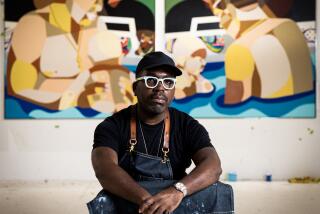Doctor talks about Donda West’s death
- Share via
The mother of rap star Kanye West, who died earlier this month after undergoing routine plastic surgery, likely succumbed to a heart attack, pulmonary embolism or accidental overdose of drugs prescribed to her for pain after the procedure, her surgeon said in an interview Monday.
In his most detailed public comments on the case, Dr. Jan Adams told The Times that nothing went wrong Nov. 9 when he performed a breast reduction, tummy tuck and liposuction on 58-year-old Donda West.
“When she left this office, there was no problem whatsoever,” Adams said during the interview at his Wilshire Boulevard medical office.
Based on his years of experience as a surgeon -- and after conversations with a West family representative and a coroner’s official -- Adams said there was a “small list of possibilities” that could have resulted in West’s death.
Adams would not say why he thought West could have suffered a heart attack. Another surgeon said through a spokesperson last week that West had approached him months ago about having cosmetic surgery but that he did not perform the procedure because of an undisclosed preexisting condition that might result in a heart attack.
Adams said he considered a drug overdose a possibility in West’s death because he had prescribed Vicodin to combat the considerable pain associated with the procedures she underwent.
Adams said West “probably [had] a rough night,” after the operation and had complained of pain the next morning. Asked whether he thought West may have taken too many of the painkillers, Adams replied: “That’s one speculation on my part, yes.”
The Los Angeles County coroner’s office, which completed a preliminary autopsy report on West last week, has not mentioned drugs as playing a role in her death.
The office’s initial review found that West died “as a result of surgery or anesthesia.” It has opened an investigation into the death.
Adams said he favored one theory in particular but declined to elaborate until the coroner’s office completes its investigation.
“I believe I know exactly what happened to her, but I will not comment on it until I see the final report,” he said.
Several hours after the interview Adams called The Times to insist that he had not been speculating about West’s case in particular but about a hypothetical patient facing similar problems.
Coroner’s officials were not available for comment, and West’s family could not be reached.
Before West’s death, Adams was a high-profile surgeon who was host of his own plastic surgery show on the Discovery Health channel and appeared on numerous TV talk shows, including “Extra” and “Oprah.”
At the time of West’s surgery, the Medical Board of California was seeking to suspend or revoke Adams’ license because of multiple alcohol-related arrests. He has two major malpractice judgments against him totaling nearly $500,000, and subsequently has been sued by patients in other cases. A review of public records also shows that Adams has liens against him for unpaid taxes.
Adams, who graduated from Ohio State University College of Medicine in 1985 and has practiced medicine in California since 1992, defended his record as a surgeon.
“Yes, there have been some malpractice suits,” he said. “But 99% of them are what we in this business call nuisance suits.”
Many of the suits, he said, were the result of patients not being happy with the way a scar healed, though they had been warned about how it might look, or not wanting to spend additional money for further work.
“There’s a level of selfishness that exists, and we as a system are telling people it’s OK to think of yourself as a victim. And the real answer is they’re not victims,” Adams said.
“And there’s nothing going on here that represents malpractice.”
He added, “When you look at the suits critically, what you find is those people who sue are those people who couldn’t afford it in the first place. And so they’re trying to recoup their money and they’re looking for anything wrong.”
He acknowledged owing about $100,000 in back taxes, resulting in liens, and $50,000 in unpaid civil judgments. One former patient says she is owed more than $200,000 on a judgment that is several years old.
Adams also said his malpractice insurance had periodically lapsed due to his failure to pay premiums on time.
As for his alcohol-related arrests, Adams said he was guilty of drunk driving in a 1994 case in Santa Monica, in which he was pulled over and arrested for drunk driving after having drinks with friends.
But he sought to downplay two other incidents, one in 2003 and another last year, which are the subject of the medical board’s pending complaint. In the 2003 case, he said, he was asked to take a roadside sobriety test after a minor traffic accident but refused. He said he was taken to a police station where he took a Breathalyzer test several times but refused to submit to a blood test. He was charged with refusing to take the test and, on the advice of his attorney, pleaded no contest.
“That was a mistake,” he said.
In 2006, he was arrested again, on the Santa Monica Freeway, and charged with drunk driving. Though he said he had drunk just one beer and had a toast with a friend that evening, he said he blew 0.09% and 0.10% on two Breathalyzer tests.
He said he fought the matter in court because he had been taking medication for a pulmonary embolism he had suffered a year earlier and was concerned that the medication may have affected the reading.
“As far as I was concerned, I certainly didn’t drink enough to be 0.08,” he said.
Adams was acquitted of drunk driving but convicted of driving with a blood alcohol content of 0.08% or above.
After the most recent arrest, Adams said, he checked into the Hazelden treatment center to be evaluated for alcoholism.
“The conclusion after two days -- and $5,000 -- was this guy is not alcohol dependent,” he said.
Adams said he was negotiating with the medical board over the alcohol issues, “because they don’t let those go.”
In explaining his financial difficulties, Adams said, “I think at a certain level it’s a fallacy that these doctors are making all that money. Certainly you can make easily, say, $50,000 a month. But when you put in overhead and insurance and all these kinds of things it costs to be a doctor, your take-home is starting to shrink considerably.”
Adams declined to say how much money he made but said he did not consider it a comfortable living.
Publicity after the West case appears to have hurt his business: He said the next 10 or 12 patients had canceled their procedures. But he said he wasn’t letting the situation get the best of him.
“You take the good with the bad,” he said.
At the end of the interview, Adams left in a black Cadillac Escalade.
--
More to Read
Sign up for Essential California
The most important California stories and recommendations in your inbox every morning.
You may occasionally receive promotional content from the Los Angeles Times.











